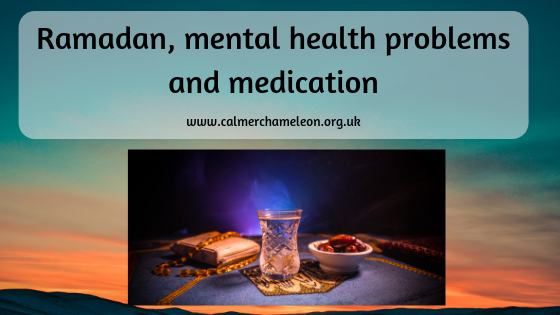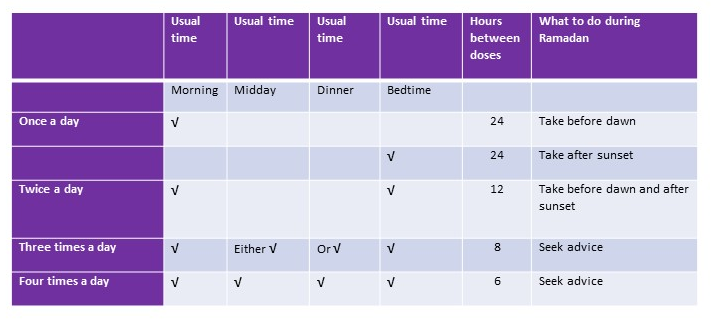Ramadan, Mental Health Problems and Medication

Ramadan is the ninth month of the Islamic calendar and an extremely important time for millions of Muslims around the world. This holy month is a time for fasting, prayer and abstinence from wrongdoing. Fasting during Ramadan is one of the Five Pillars of Islam so it is considered obligatory for all Muslims, who are healthy enough, to fast. There are exemptions from fasting, such as during pregnancy, the elderly, people with acute illnesses and those with chronic
conditions which are likely to be exacerbated by fasting from sunrise to sunset.
Fasting
Fasting during Ramadan in practice means having nothing to eat or drink from dawn to dusk, not even a glass of water. This includes medications taken in tablet or liquid form. Muslims rise early for a pre-dawn meal and will not eat or drink again until the sun has gone down. The hours of fasting each day depend on where you are in the world and when Ramadan falls in the year. In the summer months, there can be many hours of daylight.
The Effects of Fasting on Healthy Adults
Studies have been carried out to find out the effects that fasting during Ramadan has on healthy adults. The results were that people can experience mood swings, irritability, difficulties in concentration and anxiety. Fasting may also affect sleeping patterns, often resulting in less sleep.
Mental Health Problems
Mental health conditions are amongst the reasons that people may not be able to fast. The problem is that, for many people, there is still a huge stigma in admitting that they are having mental health problems. Sometimes people would rather fast and feel ill than reveal that they are being treated for mental illness. There are also those who feel very strongly about observing the fast, even if they know that their condition would mean they are exempt. It is a deeply personal decision so the advice here is intended to help you make that decision for yourself.
What to consider?
Is my condition stable at the moment?
- If you have recently had a relapse, had an increase in symptoms or experienced an episode of your mental health problem, fasting may not be a good idea this time as it can lead to further destabilisation of your condition.
- If you suffer from Bipolar Mood Disorder or Schizophrenia, fasting can affect the efficacy of your medication, meaning that a relapse is more likely. Poor sleep and change in routines can also heighten the risk of relapse so fasting is not advised. If you do decide to fast, please do so with the support of your prescribing doctor and mental health team and let those close to you know what warning signs to look out for.
What form does my medication come in?
- If your medicine is in tablet or liquid form, it would need to be taken outside of the hours of fasting
- If you have injections through the skin, muscles, veins or joints, ear drops or eye drops or patches where medicine is absorbed through the skin, these are generally seen as ok to be taken any time during Ramadan.

What if I have to take my medication three or four times a day?
- The chart below gives some hints of how you can alter the times of your medication doses but it is best to get specialist advice for medication that needs to be taken three or four times a day.
- Ask your local pharmacist and/or your prescribing doctor whether you can have your medicine in a slow or modified release form, patches or take it at different times to normal during Ramadan.
- Make sure that you carry on taking the full dose you have been prescribed and don’t make any changes until you have had advice.

Can I still have blood tests?
- Blood tests are allowed during Ramadan. If you are on medications such as Lithium your care team will need to keep track of your blood levels.
- Fasting blood tests may need to be arranged at a different time to the usual ones if you have the suhoor (dawn) meal and take medication at that time. Inform your doctor that you are fasting when the appointment is booked so that it can be arranged at an appropriate time.
Will it affect my medication if I stop smoking?
- This can cause a problem depending on what kind of medication you are on.
- If you stop smoking completely, this can increase the amount of some drugs like Clozapine and Olanzapine in your blood.
- Seek advice from your prescriber or a pharmacist as your dose may need to be altered.
- If you are still smoking from sunset to dawn, this may not affect your medication efficacy.
Fasting and Eating Disorders
If you have an eating disorder currently or have had a pattern of disordered eating in the past, fasting can be fraught with triggers and potential for relapse. When you are receiving psychological treatment, you can ask the advice of your health professionals. The most common advice is that it isn’t a good idea to fast during Ramadan.
Any change in eating patterns has the potential to set off a self-destructive chain of thoughts, feelings and behaviour. Fasting is a huge change to a normal eating pattern. It’s so hard to regain a healthy balance with food that it may not be worth taking the risk.
Feelings About Not Fasting
Fasting during Ramadan is such an integral part of being a Muslim. If you can’t fast, you might feel ashamed, embarrassed and set apart from others in your community. These feelings can be actively set off by other people judging you harshly so it’s a really difficult choice to make. I know it can be hard to go against the norm but if it is going to make you ill, it is important that you choose not to fast. No-one should judge your spiritual commitment by your ability to fast. You can demonstrate your commitment to your faith in other ways.
Alternatives To Fasting
Expressing your faith is such a personal thing so take some time to think about a meaningful way that you can do this during Ramadan instead of fasting. Here are a few suggestions:
- Buy an item of dried food each day during Ramadan and donate it to your local food bank when Eid al-Fitr arrives.
- Volunteer to do some charity work and give your time instead of fasting.
- Offer to help friends and family with jobs that they find difficult.
Whatever you choose to do,

to you all. I hope you spend this month with people you care about. If you want to let me know what you decide to do, please share using the comment box below.
